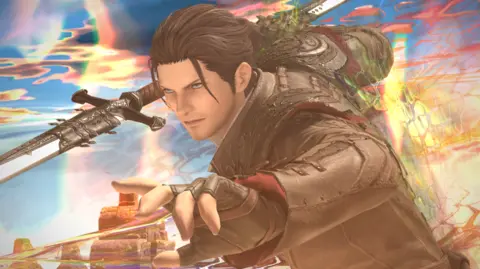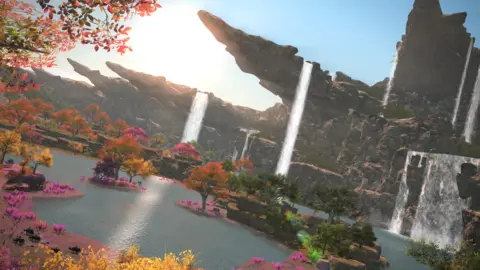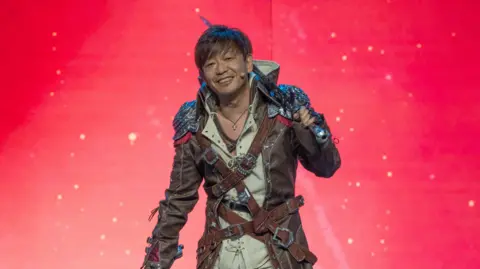39 minutes ago
By Tom Richardson, BBC Newsbeat

 Square Enix
Square Enix
Final Fantasy 14 is the most profitable game in the popular franchise, according to its makers
It's a June Friday night in Tokyo, and Naoki Yoshida has weekend plans.
"Take it easy, rest up."
Fairly standard, you might think. But Yoshida-san, the director of Final Fantasy 14 (FF14), knows that it'll probably be his last chance to relax for a while.
When he speaks to BBC Newsbeat it's a week until Dawntrail, the latest expansion to the massively multiplayer online role-playing game (MMORPG), is released.
Following a "disastrous" launch in 2010, FF14 has gone on to become the most profitable title in the franchise's history, according to publisher Square Enix.
The game's turned things around so much that servers struggled to keep up with demand when the previous expansion, Endwalker, launched in December 2021.
It's not the only change since FF14 first came out. The industry, and Japan's place in it, has also shifted over the last decade.
Final Fantasy is a massive cultural export for the country, and Square Enix has said it wants to focus more on the "global market" and its fans worldwide.
There's evidence of this approach in Dawntrail, a significant moment for Yoshida-san and his team, and one he calls "the starting point for the next 10 years of Final Fantasy 14".
Endwalker brought a decade-long story arc to a close and Dawntrail opens a new saga. It also adds a graphical overhaul to the game, along with new character classes and other features.
It's billed as a "summer vacation", with the action taking place in the sunny, Latin America-inspired Tural region of FF14's world.
Yoshida-san says Final Fantasy games have previously taken inspiration from Europe and East Asia and his team wanted to try something different.
He says Central and South America provide a "huge area" with "a lot of history" to draw from.
Authetic representation of other cultures is something Square Enix has been criticised over in the past, and its recent games have made efforts to address this.
Yoshida-san says he's always regarded FF14 as a "global game", but agrees that social media's influence has grown and "it's become easier for people to gather together and make their voices heard".
He admits "there are risks involved" in depicting other cultures, but his team has made it a point "to learn about the culture, read the texts that are available".
"The world is diverse," he says.
"There are people who have many different sets of values, many different religions, many different senses of relationships.
"And so it's really important, I feel, that we understand those points."

 Square Enix
Square Enix
Yoshida-san says the players who put their trust in his team "served as a source of motivation"
Final Fantasy games have always mixed Japanese sensibilities with Western influences, but some have suggested that the series has had an identity crisis recently.
Yoshida-san tells Newsbeat Square Enix makes "50% to 80%" of its profit from "overseas fans", who are "really important to factor in when we are creating the game".
But he believes there's a balance to be found.
"We were born in Japan, we were brought up in Japan. So what we were brought up with was parts of Japanese culture," he says.
"So if we put too much of a focus ourselves on overseas audiences, we don't have that background and that context.
"If we focus so much on the overseas audiences, then whatever we make wouldn't be successful."
However, Yoshida-san says the developers can't live in a bubble.
"I think knowing the world is very important for us in our development moving forward," he says.

 Square Enix
Square Enix
Yoshida-san is affectionately known as Yoshi-P by fans
There's recently been another significant change for Final Fantasy.
Square Enix produces games for many platforms but has a history of striking up exclusive deals to guarantee some titles only appear on certain consoles.
Sales of two recent PlayStation 5-only games, Final Fantasy 16 (FF16) and Final Fantasy 7: Rebirth, have reportedly disappointed in Japan.
Following their release CEO Takashi Kiryu told investors the company would "aggressively pursue a multiplatform strategy" to get its games on more machines.
Yoshida-san is familiar with arguments about exclusivity, having released the long-awaited Xbox version of FF14 this year.
It's a sign of a wider shift in the industry, where companies are becoming less selective about where their games appear.
In Japan, figures suggest gamers are opting to play on mobiles or the Nintendo Switch - which recently became the country's all-time bestselling console.
"We want to have players regardless of whichever device they're playing on," Yoshida-san says.
"We want them to play our game and all connect and join in and then play together in the same world."
Yoshida-san says Xbox CEO Phil Spencer "devoted a lot of his time" to getting FF14 on to Xbox.
"Thanks to his hard work, I'm super, super-glad we were able to see it to through to fruition," he says.
"But of course, there are platforms which remain."
When he's asked which those might be, Yoshida-san doesn't hesitate.
"Of course," he says. "It goes without saying that would be Nintendo's platform.
"I'm sure people are waiting for the answer to that question."

 Square Enix
Square Enix
FF14's international popularity was in evidence earlier this week when Square Enix erected a giant Aetherite crystal from the game in front of London Kings Cross station
For now, though, there's a more pressing issue on Yoshida-san's mind - giving Dawntrail "the best possible launch".
After his weekend rest, he anticipates being busy.
"I'm sure that it's going to be sleepless nights, we're going to be just eyes focused on the service status," he says.
Endwalker's rough beginnings will be on player's minds, but Yoshida-san says he's not one for dwelling too much on the past.
"It's what's already happened," he says. "And that's not really going to take us forward.
"Looking towards the future is our job."
Despite this, Yoshida-san says there is one thing important to remember.
"The players who stuck with us, [who] put their trust in the Final Fantasy 14 team.
"They really served as a source of motivation," he says.
"They really drove us to get to where we are and we would not be here without them.
"So keeping them in mind, we really just want to do our best for the Final Fantasy 14 community."


Listen to Newsbeat live at 12:45 and 17:45 weekdays - or listen back here.

 5 months ago
54
5 months ago
54















 English (US) ·
English (US) ·